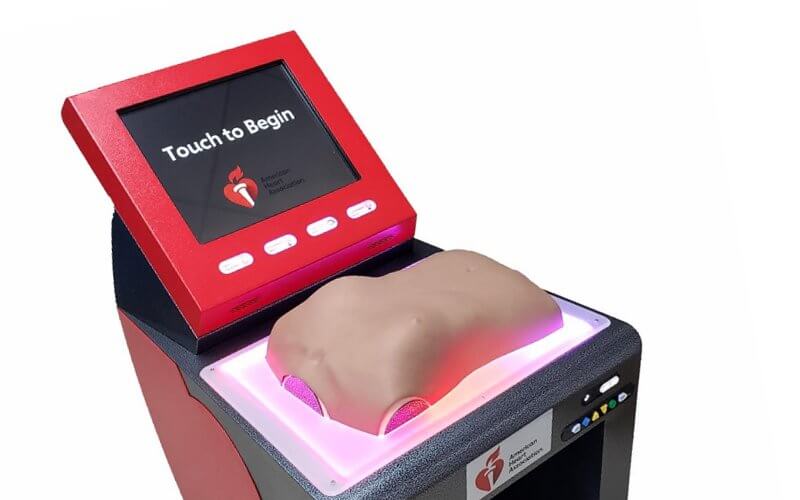
Every year, more than 350,000 cardiac arrests occur outside of the hospital, and more than 20% occur in public places like airports and sporting facilities. The American Heart Association and Edwards Lifesciences Foundation are bringing a new mobile Hands-Only CPR kiosk to Cal State Fullerton to help students, faculty and others understand how they can immediately help a person experiencing a cardiac emergency outside of a hospital.
“The kiosk will help the public understand how simple it is to perform the two steps of Hands-Only CPR, which will hopefully help reduce some of the trepidation that people have about performing bystander CPR,” said Kerri Boyd Crooks, associate director of TitanHEALTH. “After completing the kiosk training, we hope people will feel empowered knowing they are taking the first steps in learning a critical skill.”
The mobile kiosk features a touch screen with a video program that provides a brief introduction and overview of Hands-Only CPR, followed by a practice session and a 30-second test session. With the help of a practice manikin, the kiosk gives feedback about the depth and rate of compressions and proper hand placement — factors that influence the effectiveness of CPR. The entire training takes five minutes or less.
The kiosk will remain at Cal State Fullerton until early January where more than 45,000 students and over 4,200 faculty, staff and visitors will have an opportunity to learn this lifesaving skill.
An unveiling ceremony will be held on Oct. 1 at 9:30 a.m. in the Titan Student Union. The mobile kiosk and training are part of the American Heart Association’s goal to improve cardiac arrest outcomes by 2030 by having at least one person in every household prepared to perform CPR. TitanHEALTH and Associated Students Inc. worked in collaboration with the American Heart Association and Edwards Lifesciences Foundation to bring the mobile kiosk to Cal State Fullerton.
“About 90% of cardiac arrest victims die, often because bystanders don’t know how to start CPR or are afraid they’ll do something wrong,” said Mohammad (Mo) Shafie, American Heart Association Orange County/Inland Empire board president and associate director of the UCI Health Comprehensive Stroke and Cerebrovascular Center. “Bystander CPR, especially if administered immediately, can double or triple a cardiac arrest victim’s chance of survival, which is why the Hands-Only CPR education available at the kiosk is so valuable. In just a matter of a few minutes, people will learn a skill that can potentially make a difference in the lives of friends and those they love.”
To learn more about the Hands-Only CPR, visit the American Heart Association website.